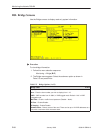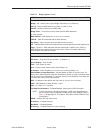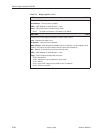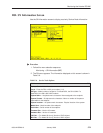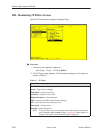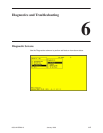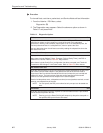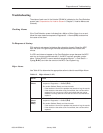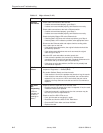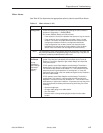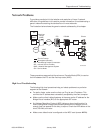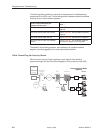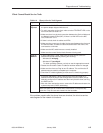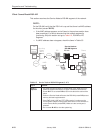
Diagnostics and Troubleshooting
6-3
8000-A2-GB26-10
January 1999
Troubleshooting
The status of each card in the Hotwire DSLAM is indicated on the Card Selection
screen (see
Components of a Hotwire Screen
in Chapter 2,
Hotwire Menus and
Screens).
Checking Alarms
If the Card Selection screen indicates that a Major or Minor Alarm is on a card,
follow the menu selection sequence
Diagnostics
→
Alarms
(D-B) to determine
the cause of the alarm.
No Response at Startup
DSL cards do not respond at startup after rebooting chassis. Reset the MCC
card. Be sure LEDs go through the reset sequence twice within about one
minute.
If a DSL card does not appear on the Card Selection screen because the MCC
card can no longer communicate with it, the MCC card will generate a major
alarm. Follow the MCC’s menu selection sequence
Monitor
→
Card Status
→
Syslog
(B-A-C) and view the event on the MCC Card System Log.
Major Alarms
Use Table 6-2 to determine the appropriate action to take for each Major Alarm.
Table 6-2. Major Alarms (1 of 2)
Alarm
Action
Selftest
Failure
1. Check the Self-test Results display by following the menu selection
sequence:
Diagnostics
→
Selftest
(D-A)
2. Do another Selftest (Reset) and check results.
– If the results are normal, the problem was transient. Log the results.
– If the results are the same as the first self-test, the card should be
replaced. If only one port on a DSL card is bad, that port can be
disabled. You may continue to use the card until it is convenient to
replace it.
Processor
Failure
(Sanity
Timer)
1. Check the Selftest Results display by following the menu selection
sequence:
Diagnostics
→
Selftest
(D-A)
2. Do another Selftest (Reset) and check results.
– If the results are normal, the problem was transient. Log the results.
– If the results are the same as the first self-test, the card should be
replaced.




